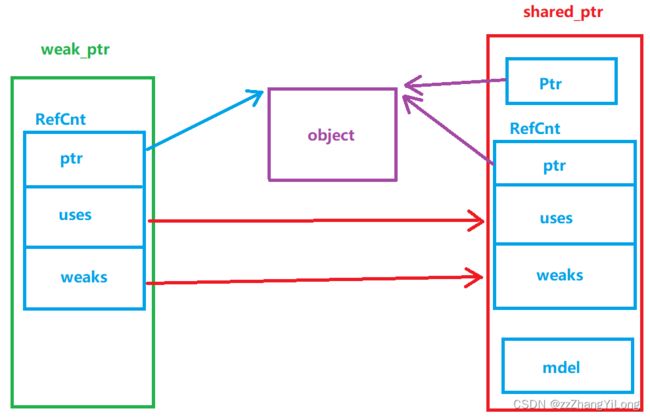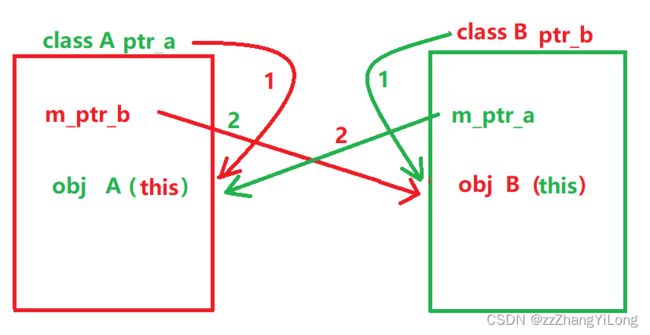C++ shared_ptr 、weak_ptr具体实现分析
1、shared_ptr 、 weak_ptr
shared_ptr
shared_ptr 采取引用计数来表示一块内存被几个智能指针所共享,当引用计数为0时,会自动释放该内存,避免了忘记手动释放造成的内存泄露问题。采用引用计数来管理内存对象的做法是Linux内核惯用的手法。
weak_ptr
weak_ptr 设计的目的是为配合 shared_ptr 而引入的一种智能指针来协助 shared_ptr 工作, 它只可以从一个 shared_ptr 或另一个 weak_ptr 对象构造, 它的构造和析构不会引起引用记数的增加或减少。同时weak_ptr 没有重载*和->,但可以使用 lock 获得一个可用的 shared_ptr 对象(引用计数会增加1)。
内存模型
2、RefCnt 和 Mdel实现
template<typename _Ty>
class Mydeletor
{
public:
Mydeletor() = default;
void operator()(_Ty* p)const
{
if (p != NULL)
{
delete[]p;
}
p = NULL;
}
};
template<typename _Ty>
class RefCnt
{
public:
RefCnt(_Ty* p) :ptr(p), Uses(1), Weaks(0)
{
cout <<"RefCnt construct"<<endl;
}
~RefCnt() {}
void IncUses()
{
Uses += 1;
}
void IncWeaks()
{
Weaks += 1;
}
protected:
_Ty* ptr;
std::atomic_int Uses;
std::atomic_int Weaks;
friend class M_shared_ptr<_Ty>;
friend class M_weak_ptr<_Ty>;
};
3 、shared_ptr 实现
template<typename _Ty,typename _De>
class M_shared_ptr
{
private:
_Ty* Ptr;
RefCnt<_Ty>* Ref;
_De mdeletor;
public:
M_shared_ptr(_Ty* p = nullptr) :Ptr(nullptr),Ref(nullptr)
{
if (p != nullptr)
{
Ptr = p;
Ref = new RefCnt<_Ty>(p);
}
}
M_shared_ptr(const M_shared_ptr& other):Ptr(other.Ptr),Ref(other.Ref)//拷贝构造
{
if (Ptr != NULL)
{
Ref->IncUses();
}
}
M_shared_ptr(const M_weak_ptr<_Ty>& other):Ptr(other.GetRef()->ptr),Ref(other.GetRef())//用weak_ptr拷贝构造
{
if (Ptr != NULL)
{
Ref->IncUses();
}
}
M_shared_ptr(M_shared_ptr&& other) :Ptr(other.Ptr), Ref(other.Ref)//移动构造
{
other.Ptr = NULL;
other.Ref = NULL;
}
M_shared_ptr& operator=(const M_shared_ptr& other)//赋值
{
if (this == &other || Ptr == other.Ptr) return *this;//自赋值,直接返回本身
if (Ptr != NULL && --Ref->Uses == 0)//被赋值的智能指针对象拥有资源,
{ //且该对象仅被该智能指针拥有
mdeletor(Ptr);//释放该对象
if (--Ref->Weaks == 0)//当弱引用计数为零时
{
delete Ref;//析构引用计数对象
Ref = NULL;
}
}
Ptr = other.Ptr;
Ref = other.Ref;
if (Ptr != NULL)
{
Ref->IncUses();
}
return *this;
}
M_shared_ptr& operator=(M_shared_ptr&& other)//移动赋值
{
if (this == &other) return *this;
if (Ptr == other.Ptr && Ptr != NULL)//当两个智能指针使用同一个对象时,且该对象不为空
{
other.Ptr = NULL;//去掉other的使用权
other.Ref = NULL;
Ref->Uses -= 1;//强引用计数-1
return *this;
}
if (Ptr != NULL && --Ref->Uses == 0)
{
mdeletor(Ptr);
if (--Ref->Weaks == 0)
{
delete Ref;
Ref = NULL;
}
}
Ptr = other.Ptr;
Ref = other.Ref;
other.Ptr = NULL;
other.Ref = NULL;
return *this;
}
~M_shared_ptr()
{
if (Ptr != NULL && --Ref->Uses == 0)
{
mdeletor(Ptr);
if (--Ref->Weaks == 0)
{
delete Ref;
}
}
Ref = NULL;
}
_Ty* get()const
{
return Ptr;
}
_Ty& operator*()
{
return *get();
}
_Ty* operator->()
{
return get();
}
size_t use_count()const
{
if (Ref == NULL) return 0;
return Ref->Uses;
}
void swap(M_shared_ptr& other)
{
std::swap(Ptr, other.Ptr);
std::swap(Ref, other.Ref);
}
operator bool()const
{
return Ptr != NULL;
}
friend class M_weak_ptr<_Ty>;
};
4、weak_ptr 实现
template<typename _Ty>
class M_weak_ptr
{
private:
RefCnt<_Ty>* wRef;
public:
size_t use_count()const
{
if (wRef == NULL) return 0;
return wRef->Uses;
}
size_t weak_count()const
{
if (wRef == NULL) return 0;
return wRef->Weaks;
}
RefCnt<_Ty>* GetRef() const
{
return wRef;
}
M_weak_ptr() :wRef(NULL) {}
M_weak_ptr(const M_shared_ptr<_Ty>& other) :wRef(other.Ref)//共享指针构造
{
if (wRef!=NULL)
{
wRef->IncWeaks();
}
}
M_weak_ptr(const M_weak_ptr& other) :wRef(other.wRef)//拷贝构造
{
if (wRef != NULL)
{
wRef->IncWeaks();
}
}
M_weak_ptr(M_weak_ptr&& other) :wRef(other.wRef)//移动构造
{
other.wRef = NULL;
}
M_weak_ptr& operator=(const M_weak_ptr& other)
{
if (this == &other||wRef==other.wRef) return *this;//自赋值或者是两个指针指向同一个对象
if (this != NULL && --wRef->Weaks == 0)//是否自己独占对象
{
delete wRef;
}
wRef = other.wRef;
if (wRef != NULL)
{
wRef->IncUses();
}
return *this;
}
M_weak_ptr& operator=(M_weak_ptr&& other)
{
//1 判断是否自赋值
if (this == &other) return *this;
//2 判断是否是指向同一个对象的两个指针相互赋值
if (wRef == other.wRef && wRef != NULL)//如果是
{
other.wRef = NULL;
wRef->Weaks -= 1;
return *this;
}
//3 两个指向不同对象的指针赋值
if (this != NULL && --wRef->Weaks == 0)//是否自己独占对象
{
delete wRef;//如果独有
}
wRef = other.wRef;
other.wRef = NULL;
return *this;
}
M_weak_ptr& operator=(const M_shared_ptr<_Ty>& other)//共享智能指针给弱指针赋值
{
if (wRef == other.Ref) return *this;
if (wRef != NULL && --wRef->Uses == 0)
{
delete wRef;
}
wRef = other.Ref;
if (wRef != NULL)
{
wRef->IncWeaks();
}
return *this;
}
M_weak_ptr& operator=( M_shared_ptr<_Ty>&& other) = delete;
~M_weak_ptr()
{
if (wRef != NULL && --wRef->Weaks == 0)
{
delete wRef;
}
wRef = NULL;
}
bool expired()const//判断被引用的对象是否删除,若删除则返回真
{
return wRef->Uses == 0;
}
M_shared_ptr<_Ty> lock()const
{
M_shared_ptr<_Ty> tmp;
tmp.Ptr = wRef->ptr;
tmp.Ref = wRef;
tmp.Ref->IncUses();
return tmp;
}
};
5、shared_from_this()
std::enable_shared_from_this 能让一个对象(假设其名为 t ,且已被一个 std::shared_ptr 对象 pt 管理)安全地生成其他额外的 std::shared_ptr 实例(假设名为 pt1, pt2, … ) ,它们与 pt 共享对象 t 的所有权。
使用原因:
1.把当前类对象作为参数传给其他函数时,为什么要传递share_ptr呢?直接传递this指针不可以吗?
一个裸指针传递给调用者,谁也不知道调用者会干什么?假如调用者delete了该对象,而share_tr此时还指向该对象。
2.这样传递share_ptr可以吗?share_ptr(this)
这样会造成2个非共享的share_ptr指向一个对象,最后造成2次析构该对象。
class T需要继承enable_shared_from_this才能使用shared_from_this(),具体源码如下:
namespace boost
{
template<class T> class enable_shared_from_this
{
protected:
enable_shared_from_this()
{
}
enable_shared_from_this(enable_shared_from_this const &)
{
}
enable_shared_from_this & operator=(enable_shared_from_this const &)
{
return *this;
}
~enable_shared_from_this()
{
}
public:
shared_ptr<T> shared_from_this()
{
shared_ptr<T> p( weak_this_ );
BOOST_ASSERT( p.get() == this );
return p;
}
shared_ptr<T const> shared_from_this() const
{
shared_ptr<T const> p( weak_this_ );
BOOST_ASSERT( p.get() == this );
return p;
}
public: // actually private, but avoids compiler template friendship issues
// Note: invoked automatically by shared_ptr; do not call
template<class X, class Y> void _internal_accept_owner( shared_ptr<X> const * ppx, Y * py ) const
{
if( weak_this_.expired() )
{
//shared_ptr通过拷贝构造一个临时的shared_ptr,然后赋值给weak_ptr
weak_this_ = shared_ptr<T>( *ppx, py );
}
}
private:
mutable weak_ptr<T> weak_this_;
};
} // namespace boost
template<class Y>
explicit shared_ptr( Y * p ): px( p ), pn( p ) // Y must be complete
{
boost::detail::sp_enable_shared_from_this( this, p, p );
}
template< class X, class Y, class T > inline void sp_enable_shared_from_this( boost::shared_ptr<X> const * ppx, Y const * py, boost::enable_shared_from_this< T > const * pe )
{
if( pe != 0 )
{
//调用 enable_shared_from_this对象的函数
pe->_internal_accept_owner( ppx, const_cast< Y* >( py ) );
}
}
可见该类包含一个weak_ptr,并在shared_ptr构造时,将weak_ptr初始化。shared_from_this()返回一个用weak_ptr拷贝构造的shared_ptr(shared_ptr有此构造函数)。
为什么一定是weak_ptr,换成shared_ptr是否可以?
类内不能包含指向自身的shared_ptr ,否则它会无法析构。
#include 执行以上操作后d_ptr的引用计数变成2,因此当main结束时,无法执行其析构函数。
6、循环引用
如果两个类互相包含指向对方的shared_ptr,就会造成循环引用。导致引用计数失效,内存无法释放。
#include 解决该问题,需要将其中一个类的shared_ptr换成weak_ptr。

